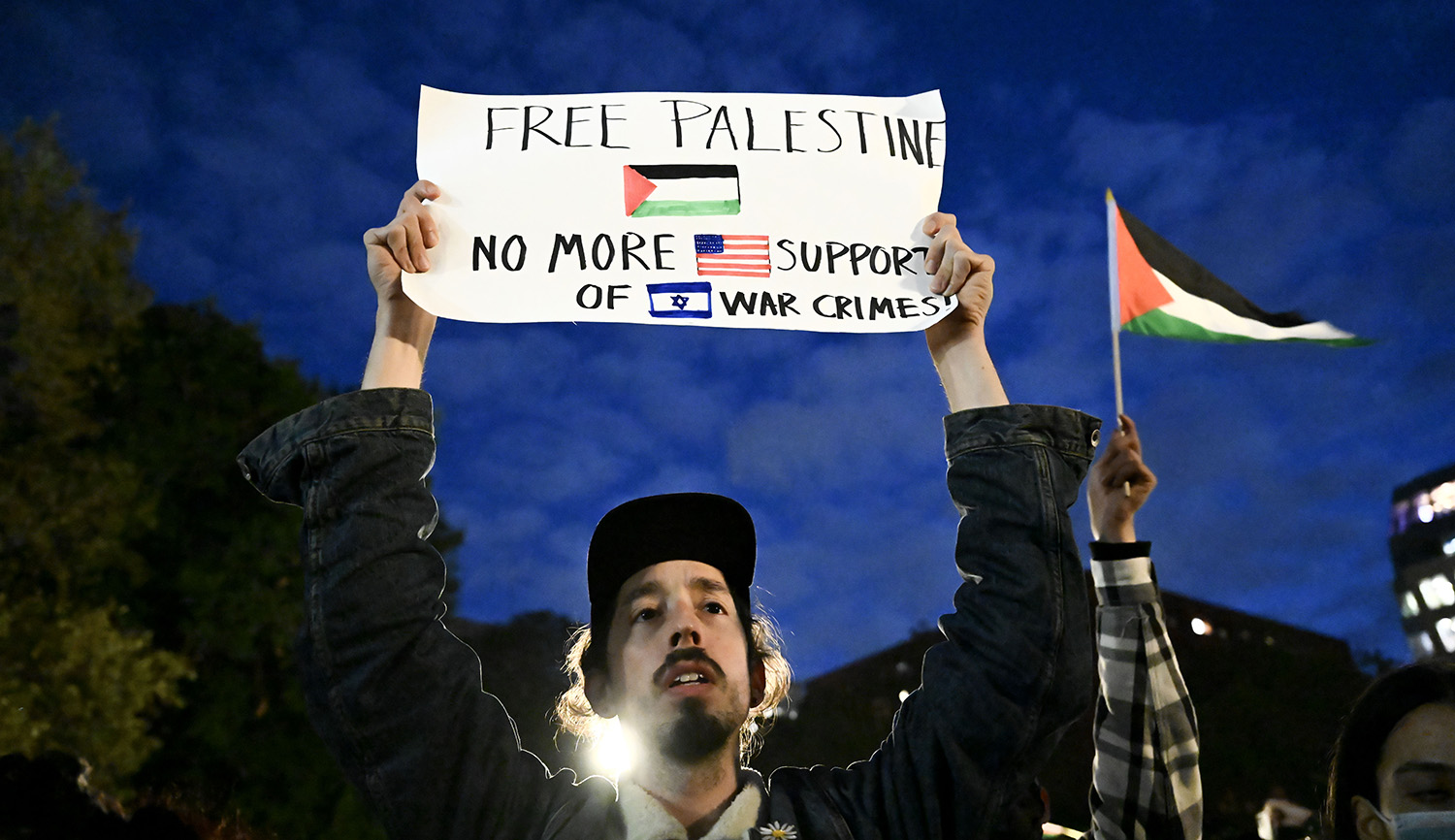One of the most dramatic effects of October 7 is that it turned Palestinian statehood from a remote possibility into an outright impossibility. On that day, supporters of Palestinian statehood, among whom I used to count myself until recently, lost their strongest argument for their view.
Let me start with a couple of biographical remarks. For a long time, I was a supporter of the two-state solution to the Israeli-Palestinian conflict. Over the years, I have become convinced that a full-blown solution to the conflict isn’t possible, because eliminationist irredentism is such an integral aspect of Palestinian national identity that even full-blown Palestinian statehood will never constitute a solution, and thus will never put an end on the conflict. However, I believed that separation from the Palestinians was still a necessity, and that even if the conflict could not be solved, it could be “frozen”—turned into something resembling the conflict between India and Pakistan, which has never been resolved but in which the level of violence can be kept low. In short, I used to believe that Israel must finish the late prime minister Ariel Sharon’s plan of unilateral withdrawal and clear out of part of the West Bank, while keeping most settlers within Israel’s final, unilaterally declared borders. Lately, however, I have become doubtful of this approach, and after October 7 I have become unambiguously opposed to it.
There are two ways of being a two-statist about the Israeli-Palestinian conflict: faith-based and evidence-based. Faith-based two-statists aren’t prepared to give up on the two-state paradigm under any circumstances. Sometimes they argue that justice demands that the Palestinians be allowed to exercise their self-determination in an independent state, no matter what the cost is for Israel. Others argue that without a two-state solution, the final outcome would “inevitably” be one state. (It’s rarely explained exactly what is inevitable about it. Advocates of the argument usually imagine a future sanctions regime that would browbeat Israel into giving citizenship to the Palestinians, but since enfranchising millions of hostile Palestinians would be a far greater existential threat to Israel than the sanctions regime itself, this doesn’t sound realistic to me.)
By contrast, evidence-based two-statists treat separation from the Palestinians as sound policy based on evidence, which, however, can be revised in the face of overwhelming counterevidence. To my mind, for years the strongest argument for separation from the Palestinians was security-based. Every time a war broke out with Hamas, and somebody said that this shows that the Gaza disengagement was a mistake, I whipped out the same chart, which showed that far fewer Israelis per year died in terror attacks after the withdrawal than before it. In my eyes, this was the ultimate argument: especially since Iron Dome was installed (although even before it), rockets couldn’t do nearly as much damage as bombing, shooting, stabbing and ramming attacks. The numbers speak for themselves, I said—and I was right. Until October 7.
Of course, there are many hypotheticals that we don’t know. We don’t know how many Israelis would have died had Israel not withdrawn from the Gaza Strip. We also don’t know what the diplomatic repercussions would have been for Israel, had it continued to hold on to the territory. However, the central security argument for withdrawal wasn’t based on such speculative hypotheticals. It was based on plain empirical evidence.
Between 2000 and 2005, before the Gaza withdrawal (and during the second intifada), there were 152 deaths from terror attacks that originated from the Gaza Strip (Israeli civilians, military personnel and foreigners together): 25.3/year on average. Between 2006 and 2015, there were 136 such deaths; 13.6/year on average (this includes two major Gaza operations, Cast Lead in 2008 and Protective Edge in 2014). After this, an especially quiet period followed: between 2016 and 2022, only 15 people died in terror attacks originating from the Gaza Strip; an average of 2.5/year. During the same six-year period, the average annual number of deaths from terror attacks from outside the Gaza Strip was far higher, 18.2/year. The last year was emblematic of this period: in 2022, there was no death from rocket attacks from the Gaza Strip, but there were 31 deaths from terror attacks from within Israel and the West Bank. The natural conclusion to draw from these data was that the withdrawal was, on the whole, good for Israel’s security despite the rocket threat: in terms of security, the areas from which Israel withdrew caused far less trouble than the area from which she didn’t withdraw. This is the line of reasoning that collapsed on October 7. The immensity of the tragedy that befell on Israel on that day is unfathomable: 1,300 dead (and counting), which is orders of magnitude more than all victims of all terror attacks between 2005 and 2023 from the West Bank and the Gaza Strip combined, and more than the death toll of the entire Second Intifada.
To my mind, October 7 decisively settles the argument over whether the Gaza withdrawal was good for Israel’s security. However, faith-based two-statists will not be moved. Perhaps they will cite moral arguments for Palestinian statehood. This is not the place to discuss those arguments; evidently, they are very different in nature from arguments that center around Israel’s own interests. However, I have never been a faith-based two-statist. I was an evidence-based two-statist, and I have to admit, with much pain, that I have now received enough evidence to abandon my former position.
Everybody who still supports Palestinian statehood, whether by a mutually agreed peace treaty or by unilateral withdrawal, needs to ask himself one simple question: “What series of events would convince me to give up my support for a Palestinian state?” I can conceive of (and personally know) commentators and observers who, in good faith, deny that the genocidal attack on October 7 constitutes sufficient evidence against the wisdom of withdrawal from the West Bank. This is a legitimate position, even if not my own; but I must ask these people to state what would have to happen for them to conclude that the paradigm of separation was a bad idea. Whether one is able to give an answer is a good test of whether one is a faith-based or an evidence-based supporter of withdrawal.
Where does this leave us? It is clear to me now that Israel cannot afford a military withdrawal from the West Bank. Notwithstanding the familiar argument that this would open up Israel to a much wider front than the Gaza Strip, we now know that even terror from Gaza can cause unacceptable levels of damage. But on the other hand, Israel cannot afford to give citizenship and residency to the Palestinians, either. This would not only dilute Israel’s Jewish majority, but would also inundate it with millions of citizens with murderous hostility to any form of collective Jewish existence between the river of the sea.
What, then, is the way forward? Israel’s controlled experiment with two states has just failed in the microcosm of the Gaza Strip. Israel’s controlled experiment with a single state is still ongoing in the microcosm of East Jerusalem, but in my judgment it has failed too. Jerusalem is united in name only, Israel’s capital is in danger of losing its Jewish majority over the coming decades, and the city will likely have to be administratively re-divided even if Israel maintains control over its eastern half. Thus, I’m afraid that in the foreseeable future, there is no alternative to something resembling the pre-2005 status quo. The status quo in unannexed parts of the West Bank has often been dubbed unsustainable, but so far it has held better than any other arrangement that Israel tried.
In the meantime, Israel should depose Hamas. Ruling the Gaza Strip directly will be very difficult, so in my view, Israel should do whatever it can to reinstall the Palestinian Authority there. There is certainly a risk in this move: Fatah under Mahmoud Abbas is unpopular in the West Bank, and it will likely be even more unpopular in the Gaza Strip. But the historical experience with Palestinians is that even though they are often engaged in terror against Israel, they don’t stage popular uprisings against their own Palestinian rulers. If Israel props up the Palestinian Authority in the Gaza Strip, it is unlikely to be violently overthrown there.
In the medium run, we have to accept the bitter pill that there is no solution. New horizons might open with a new generation of Palestinian leaders, perhaps another 75 or 150 years from now. But currently no diplomatic resolution of the Israeli-Palestinian conflict seems possible, and Israel has little choice other than preparing for many more decades of slow attrition of its enemies’ willpower to fight the Zionist enterprise.
More about: Gaza War 2023, Hamas, Israel & Zionism, Israeli-Palestinian Conflict, Two-State Solution, West Bank
















